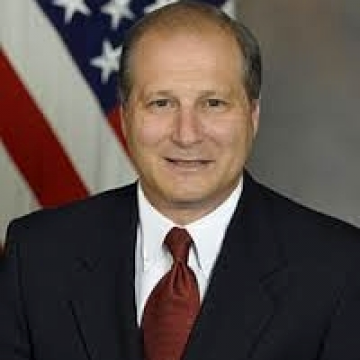The U.S. Needs to Play Hardball With Turkey
A tough stance is the only way to defend U.S. regional interests, writes Eric Edelman
Turkey and the United States have been treaty allies since Ankara joined the trans-Atlantic alliance in 1952 by formally becoming a member of NATO. Over the ensuing 70 years, Turkey’s bilateral relationship with the United States has been through its fair share of ups and downs. In the mid-1960s, the relationship was rocked by the secret U.S. deal with the Soviet Union to withdraw Jupiter missiles from Turkey during the Cuban missile crisis and former U.S. President Lyndon B. Johnson’s letter threatening not to defend Turkey over Cyprus.
Later differences over Vietnam created an anti-American backlash in Turkish public opinion. In the mid-1970s, the Turkish invasion and occupation of Northern Cyprus led to a congressionally imposed arms embargo and subsequent limits on U.S. arms exports to Turkey. Despite these periodic difficulties, a common threat perception about the dangers that Moscow posed to European and global security helped maintain a strong government-to-government relationship during the Cold War.
Following the Soviet Union’s demise in the early 1990s, the relationship between Washington and Ankara blossomed for a time and arguably reached a peak at the turn of the millennium, when President Bill Clinton declared that U.S.-Turkish ties constituted a “strategic partnership,” and U.S. diplomatic activism helped secure an invitation to Ankara from the European Union to open accession talks (an objective of Turkish foreign policy since the early 1960s).
Under the leadership of President Recep Tayyip Erdogan, this relationship has essentially been driven off a cliff during his two decades of domination of Turkish politics. Since 2003, the bilateral relationship has slowly been purposefully undermined to the point that Washington no longer has a reliable ally to work with. These days, the relationship is characterized by Turkey’s mercurial, hypocritical, and callous stance on a range of security issues.
Since the first Gulf War, Washington has gone to great lengths to accommodate Ankara’s regional security concerns. The Clinton administration was visionary in promulgating Operation Provide Comfort, which not only prevented Saddam Hussein from killing more of Iraq’s Kurdish population, but also ensured that the separatist Kurdistan Workers’ Party (PKK) of Turkey was designated as a terrorist organization. During this period, Washington closely shared actionable intelligence to limit border incursions from northern Iraq into Turkey.
Similarly, in 1999, U.S. intelligence played a pivotal role in helping to capture and deliver Turkey’s equivalent of Osama bin Laden into the hands of Turkish forces: Abdullah Ocalan, the leader of the PKK would not be in Turkish prison today had it not been for the United States. More recently, following several terrorist attacks carried out by Islamic State forces in Turkey, Washington quickly championed the deployment of Patriot missile batteries inside Turkey, sourced from NATO members.
How has Turkey reciprocated? Ankara has cozied up to the United States’ emerging great-power rivals, China and Russia. These diplomatic dalliances ultimately led to the Turkish decision to purchase, first, a Chinese air and missile defense system, and when that fell through, the decision to purchase the Russian S-400 advanced air defense missile.
Turkey has allowed itself to become a vital enabler of violent Islamist extremist forces in Syria with funds and arms flowing through Turkey into its strife-plagued neighbor. Despite repeated efforts by the United States to work out differences over rival opposition forces battling against the regime of Bashar al-Assad in Syria, Turkey has repeatedly demanded that the U.S reposition its forces, launched airstrikes on U.S. partners, and has even come dangerously close to bombing the small U.S. special forces group in a wildly irresponsible effort to rouse nationalistic fervor at home in support of Erdogan’s narrow domestic political agenda.
The Erdogan regime has held American citizens (and local employees of the U.S. government) as virtual hostages in an effort to leverage U.S. domestic politics to shut down investigations of money laundering and sanctions evasion activity by actors with ties to the Turkish state. It also refused to join the West in imposing sanctions on Putin’s Russia after the invasion of Ukraine. Instead, Turkey has become a key destination for illicit financial flows from Russian oligarchs seeking to shield their assets and a transit point for dual use goods supporting Russia’s wartime defense industry.
Finally, and perhaps most egregiously, Turkey has held Sweden’s prospective NATO membership (and earlier, Finland’s) hostage to Erdogan’s desire to extract benefits for acquiescing in steps that he had earlier told Finnish and Swedish leaders that he supported unconditionally, thus putting in jeopardy one of the most important strategic costs that President Vladimir Putin’s aggression has brought upon his own Russian Federation.
